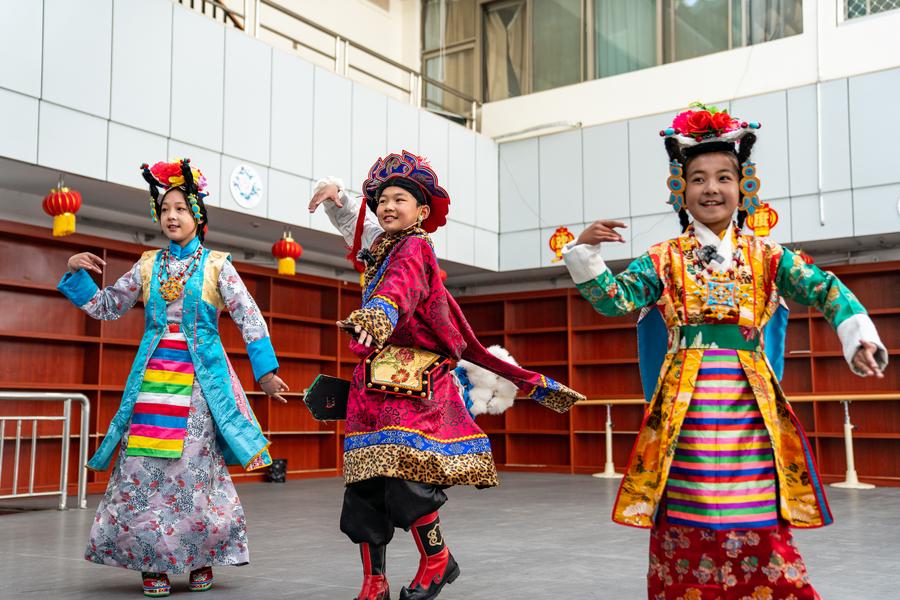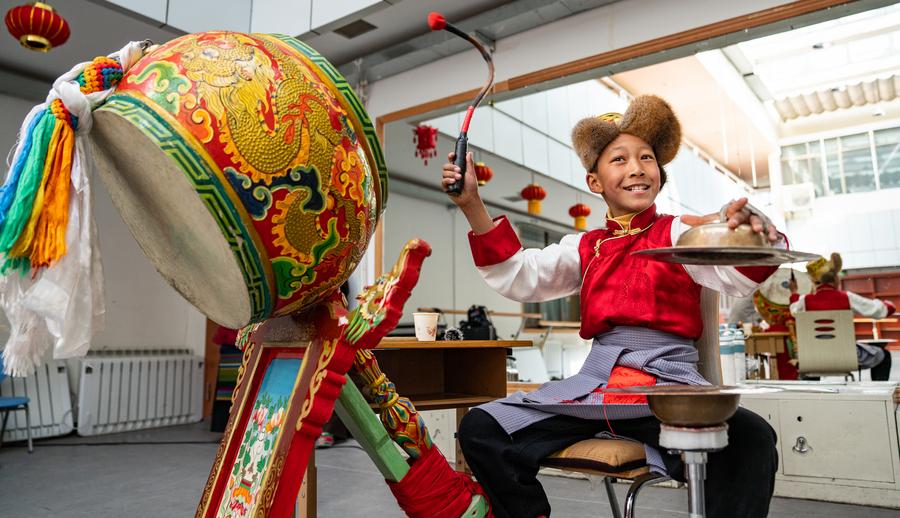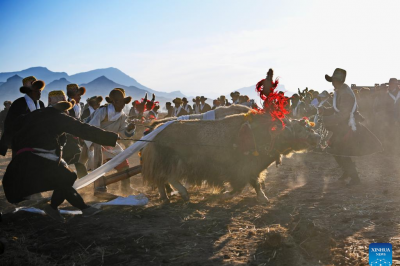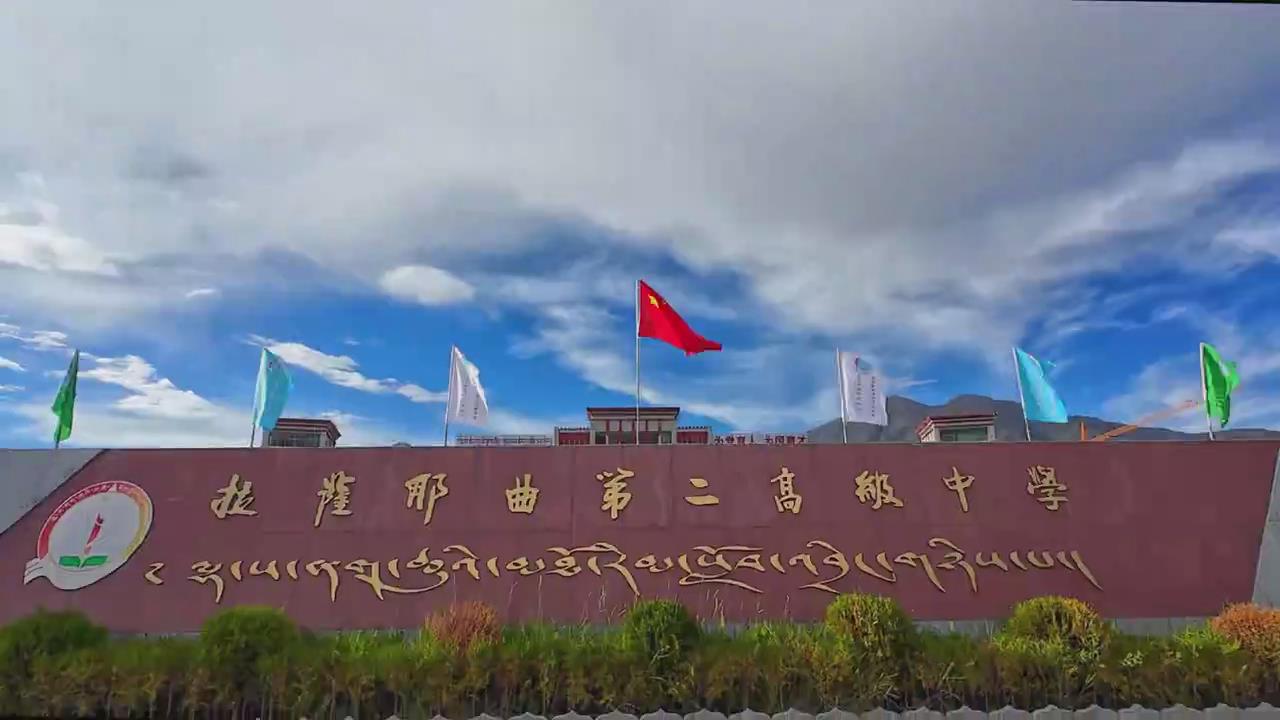| While many children choose hobbies like playing the piano, swimming or computer programming, 13-year-old Tenzin Donden stands out with his rare passion for Tibetan opera -- an art form with a history of more than 600 years.
Considered a living fossil of Tibetan culture, Tibetan opera blends talking, singing, acting, dancing and literature. It was included on the UNESCO Representative List of the Intangible Cultural Heritage of Humanity in 2009. Every weekend, Tenzin Donden travels for an hour on his mother's electric bike to reach the people's art hall of the Xizang Autonomous Region in Lhasa, the regional capital. There, he dedicates two and a half hours to honing his Tibetan opera performance skills. His fascination with the style of opera began when he was 3. Whenever his grandparents would travel from Lhunzhub County to downtown Lhasa, they would take him to Norbulingka, known as Lhasa's "Summer Palace," to watch opera performances. "I was deeply fascinated by the art. It was so cool," said the teenager, who aspires to become a professional Tibetan opera performer.
Tenzin Donden (C) and other students perform Tibetan opera in Lhasa, southwest China's Xizang Autonomous Region, Feb. 26, 2024. (Xinhua/Tenzin Nyida) POPULARITY AMONG YOUNG PEOPLE In 2015, the people's art hall of Xizang launched free Tibetan opera courses, nurturing approximately 200 students like Tenzin Donden. "Mastering Tibetan opera requires a blend of acting, singing and dancing skills. It's not easy," said 63-year-old Pasang, a renowned performer who teaches at the people's art hall. "Any child with an interest is welcome to join," said Phurjung, 64, who is also a teacher. He remembers a student from the Han ethnic group who once attempted to learn the opera style but had to abandon his training due to the high proficiency in the Tibetan language that was required. Last year, Tenzin Donden and 11-year-old Chimed Drolkar performed in "Brothers Donyo and Dondrup," marking the debut of a children's stage play presented as Tibetan opera in Xizang. It tells the story of two princes, who are half brothers through their father, reuniting after many life-or-death challenges. Chimed Drolkar started learning Tibetan opera at the age of 4. She played multiple roles in "Brothers Donyo and Dondrup," and Tenzin Donden played Wonbar, the opera's narrator, saying that he found the role to be the most challenging and enjoyable of all the roles he had ever performed. "Tibetan opera is full of fantasy and mystery, much like the foreign fairy tales that I have read, like 'Snow White and the Seven Dwarfs' and 'The Little Mermaid,'" Chimed Drolkar said. In "Sukyi Nyima," another Tibetan opera, Chimed Drolkar and Tenzin Donden collaborated once again, respectively portraying a fairy and a hunter. The pair recently won a prestigious national award, after their opera stood out from a pool of over 100 productions in such genres as Sichuan Opera, Peking Opera and Kunqu Opera. Thanks to online platforms like Douyin and WeChat, their performances can now reach wider audiences, particularly during traditional occasions such as the Tibetan New Year and the Shoton Festival.
Xizang has made great efforts to protect its culture. Back in 2005, the autonomous region initiated an intangible cultural heritage protection project. One year later, Tibetan opera was included on the first list of national-level intangible cultural heritage, three years before its recognition by UNESCO. There are now over 150 part-time Tibetan opera troupes. "I'm thrilled to see Tibetan opera being introduced into many primary and middle schools," Pasang said. "Whether my students choose to pursue careers as professional performers or not, I firmly believe that this traditional art will enrich their lives as a lifelong passion." BLENDING OLD AND NEW Legend traces the origin of Tibetan opera over 600 years ago to Thangtong Gyalpo, a revered monk and skilled bridge builder in Xizang. To fund his iron bridge projects, he created a troupe of singers and dancers, whose performances became known as Tibetan opera. Phurjung describes Tibetan opera as "a fusion of tradition and modernity." "We adorn the stage with a thangka depicting Thangtong Gyalpo during performances, a tradition that persists to this day," he said. Though Tibetan opera has many traditions, much has changed over the years. As gender equality has progressed hugely, female actors now grace the Tibetan opera stage, rather than the traditional practice of hiring male actors for female roles. In Phurjung's hometown of Bainang County in Xigaze, performances featuring vivid masks, dancing, singing and colorful costumes have been staged on wheat-threshing floors, in pastures and in open gardens. Drums and cymbals set the rhythm, and some performances can last for days. In urban areas, Tibetan opera has been performed in theaters using modern technology, including advanced sound and lighting systems, and accompanied by scrolling Tibetan and Mandarin subtitles to enhance audience engagement and understanding. To preserve and modernize the style of opera, which has roots in folk stories, historical legends and Buddhist classics, Phurjung and his colleagues plan to create a series of productions with contemporary themes.
Tibetan opera, alongside thangka painting and Tibetan cuisine, has boosted Xizang's global appeal. Last year, the region attracted over 55 million tourists. In Tashi Chodan, a community in Shannan City known for Tibetan opera, the art form has spurred economic growth. In 2023, the community welcomed 16,000 visitors, generating over 1.85 million yuan (about 257,000 U.S. dollars) in tourism revenues. Tibetan opera, like many other traditional Chinese opera styles, faces challenges in attracting and retaining young performers. But Ngawang Norbu, 29, plans to spend his life pursuing the art form. In 2022, the former thangka painting student joined the community's Tibetan opera troupe. To enhance his singing skills, he climbs a nearby hill every day and practices at the top for four hours, repeatedly imitating audio from his phone. He harbors a grand dream: to take Tibetan opera to various parts of the world, including the United States and Britain. "I want to dispel the misconception that our culture is fading. Instead, it's thriving and being passed down." Indeed, Tibetan opera has already crossed international borders and reached a global audience. Before their retirement, Pasang and Phurjung traveled with a regional opera troupe to perform in more than 10 countries, including the United States, Canada and Austria. During shows overseas, Tibetan opera is accompanied by English subtitles. Inspired by his teachers, Tenzin Donden is dedicated to mastering multiple languages, including Tibetan, Mandarin and English. "English is my latest endeavor, and though challenging, I aim to master it to bring Tibetan opera to more people," he said. |
- Home
- News Tibet |Exclusive |China |World |Related News |Latest
- Documents White Papers |Others
- Photo Politics |Economy & Society |Culture & Religion |Human & Nature |Beautiful Tibet |Other Tibetan-Inhabited Area |Exchanges |Related
- Video News |Documentary |Micro-Video |Entertainment
- Art
- Tourism
- In Focus
- About Tibet









